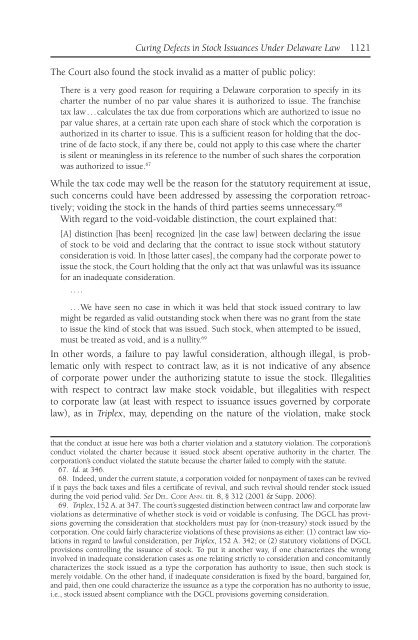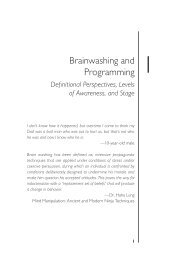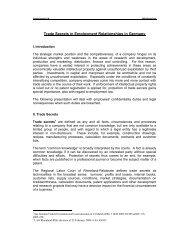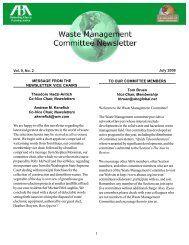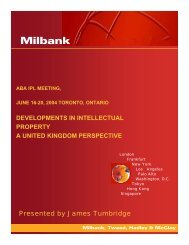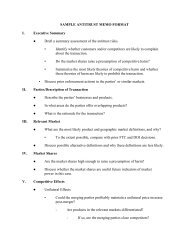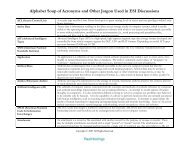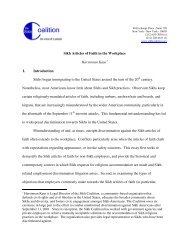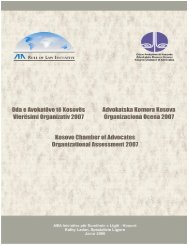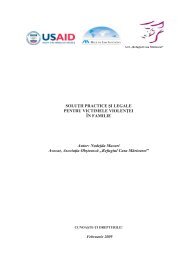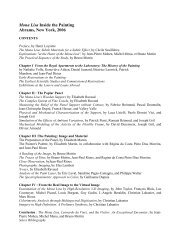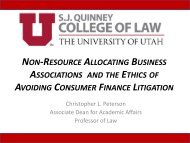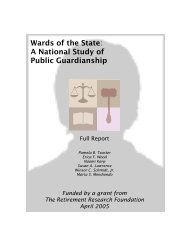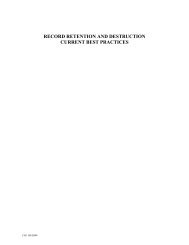Curing Defects in Stock Issuances - American Bar Association
Curing Defects in Stock Issuances - American Bar Association
Curing Defects in Stock Issuances - American Bar Association
You also want an ePaper? Increase the reach of your titles
YUMPU automatically turns print PDFs into web optimized ePapers that Google loves.
<strong>Cur<strong>in</strong>g</strong> <strong>Defects</strong> <strong>in</strong> <strong>Stock</strong> <strong>Issuances</strong> Under Delaware Law 1121<br />
The Court also found the stock <strong>in</strong>valid as a matter of public policy:<br />
There is a very good reason for requir<strong>in</strong>g a Delaware corporation to specify <strong>in</strong> its<br />
charter the number of no par value shares it is authorized to issue. The franchise<br />
tax law . . . calculates the tax due from corporations which are authorized to issue no<br />
par value shares, at a certa<strong>in</strong> rate upon each share of stock which the corporation is<br />
authorized <strong>in</strong> its charter to issue. This is a suffi cient reason for hold<strong>in</strong>g that the doctr<strong>in</strong>e<br />
of de facto stock, if any there be, could not apply to this case where the charter<br />
is silent or mean<strong>in</strong>gless <strong>in</strong> its reference to the number of such shares the corporation<br />
was authorized to issue. 67<br />
While the tax code may well be the reason for the statutory requirement at issue,<br />
such concerns could have been addressed by assess<strong>in</strong>g the corporation retroactively;<br />
void<strong>in</strong>g the stock <strong>in</strong> the hands of third parties seems unnecessary. 68<br />
With regard to the void-voidable dist<strong>in</strong>ction, the court expla<strong>in</strong>ed that:<br />
[A] dist<strong>in</strong>ction [has been] recognized [<strong>in</strong> the case law] between declar<strong>in</strong>g the issue<br />
of stock to be void and declar<strong>in</strong>g that the contract to issue stock without statutory<br />
consideration is void. In [those latter cases], the company had the corporate power to<br />
issue the stock, the Court hold<strong>in</strong>g that the only act that was unlawful was its issuance<br />
for an <strong>in</strong>adequate consideration.<br />
. . . .<br />
. . . We have seen no case <strong>in</strong> which it was held that stock issued contrary to law<br />
might be regarded as valid outstand<strong>in</strong>g stock when there was no grant from the state<br />
to issue the k<strong>in</strong>d of stock that was issued. Such stock, when attempted to be issued,<br />
must be treated as void, and is a nullity. 69<br />
In other words, a failure to pay lawful consideration, although illegal, is problematic<br />
only with respect to contract law, as it is not <strong>in</strong>dicative of any absence<br />
of corporate power under the authoriz<strong>in</strong>g statute to issue the stock. Illegalities<br />
with respect to contract law make stock voidable, but illegalities with respect<br />
to corporate law (at least with respect to issuance issues governed by corporate<br />
law), as <strong>in</strong> Triplex, may, depend<strong>in</strong>g on the nature of the violation, make stock<br />
that the conduct at issue here was both a charter violation and a statutory violation. The corporation’s<br />
conduct violated the charter because it issued stock absent operative authority <strong>in</strong> the charter. The<br />
corporation’s conduct violated the statute because the charter failed to comply with the statute.<br />
67. Id. at 346.<br />
68. Indeed, under the current statute, a corporation voided for nonpayment of taxes can be revived<br />
if it pays the back taxes and fi les a certifi cate of revival, and such revival should render stock issued<br />
dur<strong>in</strong>g the void period valid. See DEL. CODE ANN. tit. 8, § 312 (2001 & Supp. 2006).<br />
69. Triplex, 152 A. at 347. The court’s suggested dist<strong>in</strong>ction between contract law and corporate law<br />
violations as determ<strong>in</strong>ative of whether stock is void or voidable is confus<strong>in</strong>g. The DGCL has provisions<br />
govern<strong>in</strong>g the consideration that stockholders must pay for (non-treasury) stock issued by the<br />
corporation. One could fairly characterize violations of these provisions as either: (1) contract law violations<br />
<strong>in</strong> regard to lawful consideration, per Triplex, 152 A. 342; or (2) statutory violations of DGCL<br />
provisions controll<strong>in</strong>g the issuance of stock. To put it another way, if one characterizes the wrong<br />
<strong>in</strong>volved <strong>in</strong> <strong>in</strong>adequate consideration cases as one relat<strong>in</strong>g strictly to consideration and concomitantly<br />
characterizes the stock issued as a type the corporation has authority to issue, then such stock is<br />
merely voidable. On the other hand, if <strong>in</strong>adequate consideration is fi xed by the board, barga<strong>in</strong>ed for,<br />
and paid, then one could characterize the issuance as a type the corporation has no authority to issue,<br />
i.e., stock issued absent compliance with the DGCL provisions govern<strong>in</strong>g consideration.


